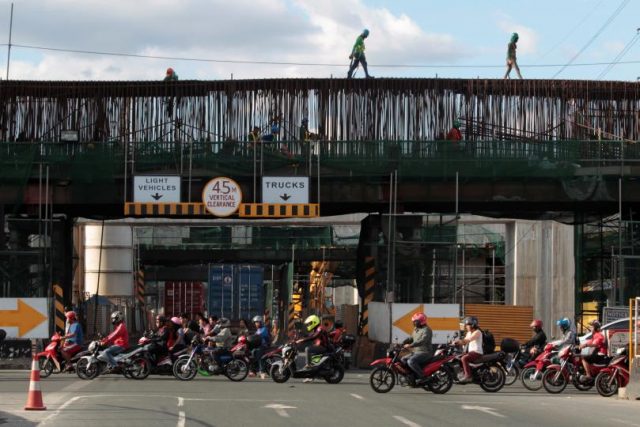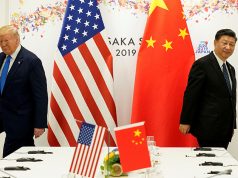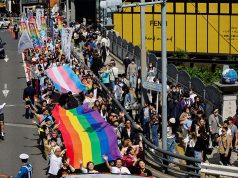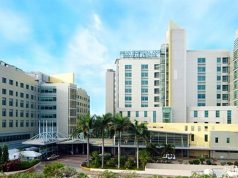Jose Enrique A. “Sonny” Africa is executive director of IBON Foundation. He has written extensively on socioeconomic and political issues for various institutions here and abroad. In the name of IBON he has also written a book on children, women and armed conflict in the Philippines for UNICEF and a book on the Philippine health sector. He obtained his Master’s degree (MSc) in Development Studies and Bachelor’s degree (BSc) in Philosophy and Economics from the London School of Economics and Political Science (LSE).
The Tax Reform for Acceleration and Inclusion Act (TRAIN), the first part of the Duterte administration’s Comprehensive Tax Reform Program (CTRP), has hurdled the House of Representatives (HOR) and is up for deliberations at the Senate. The Department of Finance (DOF) targets approval of TRAIN, or House Bill No. 5636, soon after sessions resume in late July.
The DOF’s tax reform proposals include: higher consumption taxes from removing VAT exemptions (though retaining those for senior citizens and persons with disabilities) and new excise taxes on petroleum products, sugar-sweetened beverages, and automobiles; and lower income and wealth taxes from reduced personal income tax rates (PIT, indexed to inflation) and a lower flat 6% rate for estate and donor’s taxes.
Pres. Rodrigo Duterte certified TRAIN as urgent and his main economic managers — the finance, budget and economic planning secretaries – have been aggressively pushing it since last year. The bill is also supported by a wide range of other high-income earners spanning the 246 HOR lawmakers voting in favour of it, former finance secretaries and heads of the National Economic and Development Authority (NEDA), economists, business tycoons, big business groups, foreign chambers of commerce in the country, financial institutions like Deutsche Bank and Nomura, and others.
The government and the wealthy private sector constantly invoke national development and the welfare of the poor to justify their position. Yet the conspicuous lack of similar clamor on the part of the country’s poor majority is not surprising — the DOF’s TRAIN is grossly anti-poor, brazenly pro-rich, and should be derailed.
THESE ARE THE DOF’S FIVE (5) BIGGEST TAX REFORM LIES:
1) “We will lessen the overall tax burden of the poor” and “increase the take-home pay of most individuals thereby putting more money in people’s pockets” where “99% of taxpayers will pay less taxes” — The truth: the tax reform will make the poor poorer.
The net impact of the change in income taxes, expansion of VAT coverage, new oil excise taxes, and inflationary effect is that the poorest 60% of Filipino households, or 13.7 million households with some 60 million Filipinos, will have less money in their pockets after the tax reform.
The government will in effect take away Php737 annually from the pockets of the poorest 2.3 million families with an average monthly household income of just Php5,214 in 2018 (first and lowest income decile), Php980 from the next poorest 2.3 million families with monthly income of Php8,315 (second income decile), Php1,163 from the next poorest 2.3 million families with monthly income of Php10,691 (third income decile), Php1,374 from the next poorest 2.3 million families with monthly income of Php13,015 (fourth income decile), Php1,687 from the next poorest 2.3 million families with monthly income of Php15,746 (fifth income decile), and Php2,088 from the next poorest 2.3 million families with monthly income of Php19,269 (sixth income decile).
The poorest 60 million Filipinos will pay more taxes under the proposed tax package with higher prices on food, drinks, LPG, transport fares, electricity, housing and other basic goods and services they consume. It will in effect take away Php737 from every rice farmer, Php980 from every farm worker, Php1,163 from every construction worker, Php1,374 from every private school teacher, Php1,687 from every bookkeeper, and Php2,088 from every machine tool operator. The figures from a DOF table supposedly computing the change in annual take-home pay in 2018 are however likely even underestimated. For instance, the DOF has also estimated that the oil excise tax alone will increase a fisherman’s fuel expenses by Php1,089 and of a farmer’s by Php1,210 with the VAT and inflationary impact even coming on top of these.
The income tax exemption for minimum wage earners, personal and additional exemptions, and health insurance premium payments are also proposed to be lifted. While minimum wage earners will still not pay taxes for now — because income tax starts to be paid upon reaching an annual income of Php250,000 a year — it is possible that they will be subject to income taxes in the future if the minimum wage reaches the first taxable income tax bracket.
2) “After the tax-transfer reform, the poor benefits the most” and “the tax system will be fairer and more equitable” – The truth: the tax reform will make the rich richer.
The net impact of the change in income taxes, expansion of VAT coverage, new oil excise taxes, and inflationary effect is that the highest-earning 40% of Filipino households, or 9.1 million households with some 40 million Filipinos, will have more money in their pockets after the tax reform. This includes among the richest households in the country.
The 2.3 million families with an average monthly household income of Php24,355 (seventh income decile) will gain an additional Php4,187 annually, the next 2.3 million families with monthly income of Php32,295 (eighth income decile) will gain an additional Php8,012, the next 2.3 million families with monthly income of Php47,131 (ninth income decile) will gain an additional Php16,954, and the richest 2.3 million families with monthly income of Php111,380 (tenth and highest income decile) will gain an additional Php43,540. They have net gains because their increased take home pay from lower personal income taxes more than offsets losses from additional VAT, oil taxes, and inflation. The net gains also remain even if higher taxes on automobiles and especially on high-end luxury cars, which is sensible, are factored in.
Middle class households in the seventh to ninth income deciles certainly deserve relief from changing decades-old tax brackets. These include Filipino families whose only moderate incomes are doubly-eroded by inflation and by excessively high taxes. It can even be argued that the minimum figure for tax exemptions can be raised to those earning up to around Php33,000 monthly.
However it does not make sense for supposed tax reforms to give a corporate executive already earning Php280,309 monthly (or Php3.4 million yearly) an additional Php91,027 or a company’s chief executive officer already earning Php598,132 monthly (or Php7.2 million yearly) an additional Php130,267. Yet the DOF’s TRAIN does just that while, to recall, taking hundreds of pesos away from the poorest Filipinos who already have so little as it is. The poorest are made to pay more out of much smaller incomes to begin with and this is not by any reasonable interpretation a “fairer and more equitable” tax system.
The DOF cites the supposedly higher income tax rate of 35% applied to the highest income bracket, compared to the current 32%, as proof of the progressivity of their proposals. This is a half-truth though because using the complete formula which includes a minimum lump sum and applying the tax rate only on the excess of income over Php5 million means that many of the country’s rich will actually end up paying less than under the current tax system.
The DOF also gives the example of the country’s top two income taxpayers whose take home pay falls in 2018 upon the tax reform to reinforce the impression that the new tax system is progressive. This is however an exaggeration and is oblivious to how the country’s super-rich use various legal and illegal strategies to avoid paying taxes including tax havens, off-shore accounts, shell companies and trust funds, smuggling and others.
The tax reform program really does nothing to address, and actually worsens, the continuing accumulation of massive wealth in the hands of a few. The country’s richest for instance also gain additional benefit from the lowering of estate and donor’s taxes to a flat rate of 6%, with the DOF estimating that they will pay at least Php3.1 billion less per year starting 2018.
3) “We are committed to uplift the poor and the vulnerable through a progressive social protection using targeted cash transfers and public transport subsidies” – The truth: TRAIN’s taxes are permanent but its social protection is only temporary and, worse, still just an undefined afterthought.
The only reason the DOF can argue that the poor benefit is because TRAIN supposedly has a social protection component. Early proposals included a targeted cash transfer of Php300 per month to the poorest 50% or some 10 million households in the country to mitigate rising prices and a Pantawid Pasada scheme of cash cards for public utility vehicles to offset the impact of the increase in oil excise taxes especially on diesel.
The TRAIN bill passed by the HOR however remains extremely vague on these supposed social protection measures. Out of the 59-page bill, there is only a third (1/3) of a page on them with just cursory mention of a “social benefits program” and “granting fuel vouchers to qualified transport franchise holders.”
The only clarity given is that the measures will last for just three years. This means that even assuming that they are implemented, the measures are only temporary and the majority poor of the country will be struggling with the onerous tax burden of TRAIN long after the social protection measures have ended. This gives credence to the notion that they are only being implemented to divert from the gross regressiveness of the new tax package. Such a smokescreen also comes at a price and the administrative cost of the scheme will run into at least hundreds of millions of pesos and perhaps even into the billions.
4) “If no or diluted tax reform, the outcome will be poverty, malnutrition and traffic” and “the poor will likely remain poor” – The truth: the DOF is blackmailing the poor because it is afraid to tax the rich.
The threat of poverty, malnutrition and indeed the traffic oddly mentioned in the same breath is directed at the country’s poor farmers, workers, informal sector, low-paid employees and others who already suffer these the worst. It is certainly true that the government needs resources for the many different things needed to ensure social and economic development for the majority. Schools, hospitals and homes have to be built, roads, bridges, water systems and power plants have to be constructed, factories and farms have to be developed, and the economy has to be strengthened.
The DOF is however disingenuous in putting the burden of providing these resources on the majority of Filipinos who have such low incomes and barely any assets to begin with, rather than on the few elite families and corporations who not only have such high incomes but have also amassed huge wealth from the economy over decades. Poorer families earning just a few thousand pesos a month with barely any savings and scant assets cannot be treated the same way as the richest families earning hundreds of thousands (or even millions) of pesos a month with hundreds of millions (or even billions) in savings and assets.
The extreme concentration of wealth in a few in the country is an opportunity for real tax reforms that do not just raise revenues for development but also reduce inequality. Today, some 17 million Filipino families (80% of all families) earn at most around Php20,000 a month; the poorest half (53%) try to live off less than Php13,000 a month and the poorest fifth (20%) on an average of less than Php5,600 a month. These poor and low income families should be taxed as lightly as possible while being given as much publicly-provided social and economic services as they need.
On the other hand, the richest 156,000 or 0.7% of families had a cumulative income of Php356.9 billion in 2012 with an average annual income of Php2.3 million – taxing just an additional 20% of this income can raise Php71 billion. The next richest 170,000 or 0.8% of families had a cumulative income of Php198.4 billion with an average annual income of Php1.3 million – taxing just an additional 10% of this income can raise Php20 billion. So raising income taxes on just the richest 1.5% of Filipino families can already raise some Php91 billion.
While the DOF often mentions “shared responsibility,” its tax reforms are conspicuously silent on taxing the super-rich’s massive wealth. For instance, there are reportedly at least 690 “ultra-high net worth” Filipinos with at least Php1.4 billion in assets each. This includes the country’s 50 richest oligarchs who have a combined net worth of US$79.5 billion or Php3.8 trillion at current exchange rates and 14 of whom recently landed on Forbes’ World Billionaires list.
The DOF is correct in pointing out “dire consequences [on] the lives of the poor and vulnerable” from “[losing] classrooms, teachers, rural health units, barangay health stations, provincial hospitals, paved roads, bridges and irrigated land”. For the sake of argument it can also be granted that greater infrastructure spending will increase economic activity and output at least in the short-term. It should however not look to the poor for the resources to finance these but to the rich, especially the super-rich, who have already benefited so much from the economy, from its infrastructure, and indeed from the labors of the poor themselves.
5) “Tax Reform for Acceleration and Inclusion” – The truth: TRAIN deforms the tax system to become even more anti-poor and pro-rich.
To “reform” is to make something better but, for all the reasons mentioned above, the DOF is not reforming the tax system. The tax proposals are even exclusionary in disproportionately burdening the poor while relieving the rich. To call the proposals “Tax Reform for Acceleration and Inclusion” is then the biggest lie of them all.
The Duterte administration’s tax reform program starkly reflects the country’s class divide and is neoliberalism in full play. The upper classes and foreign capital are clamoring to pay lower taxes and to have their infrastructure and other services paid for by the poor. The government is unfortunately complicit and doing all it can to deliver these benefits for a wealthy minority at the expense of the poor majority.
Ruling elites should however be worried. The resulting further build-up of wealth in the hands of a few from reducing the incomes of the many will only increase social conflict and tensions, intensify class contradictions, and create the conditions for a great upheaval. The real reforms will come after this










